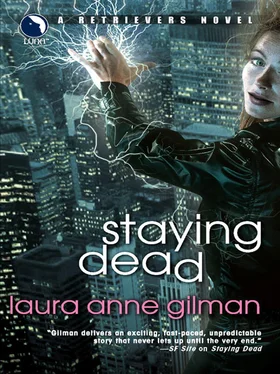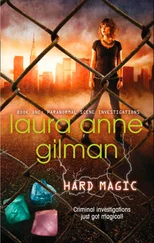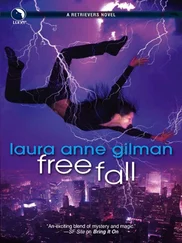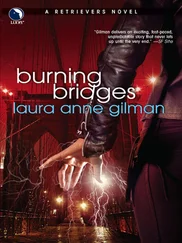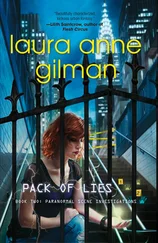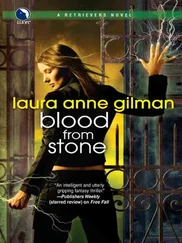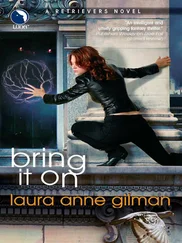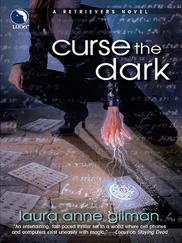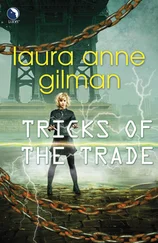“Which would mean your list?” Sergei placed his knife and fork down precisely on the table. On cue, Callie swooped down and cleared their table, scraping the crumbs off the tablecloth with a small metal tool and handing them each a dessert menu. She might be an annoying eavesdropper, but she was an excellent waitress. “How many of them would fit those criteria?”
“All of them, probably.” She pushed aside the menu without even looking at it. Time to tell the truth—if not all of it. “Like I said, they may not be as highly placed, but they all have grudges, and the means to execute them.”
“So…?” Oh, she knew that tone of voice. Damn. And twice damn. He knew she was hiding something—he always knew, somehow. Like a vulture knows when dinner’s about to pass over. She looked up into deep brown eyes and wanted to tell him everything. Only a decade’s worth of resisting that lure—and seeing it work on too many others—gave her the ability to look away.
Sorry, partner. This one I’ve got to deal with on my own. You’d only freak, anyway.
“So I’ll try to narrow the list down. See if I can’t talk to some of them, face-to-face.”
Sergei kept his face calm, and only the little tic at the corner of his jaw gave him away. “Any of them wizzarts?” Casual. Too casual. She could hear enamel grind. Their partnership had taught him when to step back and let go, too. He just didn’t always—ever!—listen to what he knew.
“A couple. All recent, though, nothing to worry about. I can handle myself, big guy.”
She hoped.
Although it was nearing noon, activity on Blaine Street, deep in the so-called “artist’s maze” favored by trendy galleries, was better suited to early morning, with half the stores just beginning to see an early trickle of customers. The short, narrow street had clearly once been the home to warehouses, metal steps rising up from the curb to oversized metal doors set in otherwise stark brick buildings. But where most of the other converted buildings that now housed trendy stores and galleries had clear glass windows, the better to display their contents in a carefully designed presentation, the narrow glass front on 28 Blaine had been replaced with artisan-made stained glass. The deep blues, reds and greens seemed at first to be randomly placed, but if you stepped back a moment, the wavy striations in the glass and the choice of colors created the appealing effect of an underseascape.
Between the window and metal double doors, a small bronze plaque announced that this was the home of The Didier Gallery.
Inside the gallery, the floor was covered in a muted gray carpet, and walls painted Gallery White were hung with paintings in groupings of three or four, interspersed occasionally with a three-dimensional piece on a pedestal. The works displayed this month were brash, almost exhibitionist in their use of color. A curved counter ran through the middle of the space, and behind it a sturdy wrought-iron staircase rose to the second-floor gallery, where smaller pieces were displayed. A young blond man sat at the desk, flipping through a catalog. He looked as though he belonged in a catalog himself: perfectly coiffed, elegantly dressed and bored out of his overbred skull.
Sergei blew through the door, setting the chime alert jangling. The young man looked up, gauged the expression on his boss’s face, and wisely decided not to speak unless spoken to. One look around told Sergei that no one else was in the gallery, and with a grunt that could have been satisfaction or disgust, he nodded to his associate and went to the back wall of the gallery, where touching a discreet wall plate opened the door to his private office.
The door closed behind him, and the young man went back to flipping through the catalog.
“Of all the stupid, harebrained…” Sergei had managed to keep a hold on his temper all the way home from Genevieve’s apartment, which meant that by now, although he was just as angry as before, he was unable to let go and have the temper tantrum he so righteously desired.
She hadn’t answered the phone when he had called this morning. She hadn’t been home when he had arrived on her doorstep an hour later. Not that she didn’t have a perfect right to go off on her own. He was her partner, her agent, not her damned keeper. That would have been a full-time job alone. But he had known she was hiding something, damn it. Had known sitting there across from her during dinner, and let it go, and that was his fault.
It hadn’t been until this morning, as he was taking his morning walk, that one of the names on the list had jumped out of his brain and thwapped him soundly across the face. He hadn’t recognized it at first, because he only thought of the man by the nickname the Cosa had given him.
Stuart Maxwell. She was going to confront Stuart Maxwell, otherwise known in Talented circles as The Alchemist. The man so hooked into the current he could turn wishes into water, and water into wine. The man who, the last time Wren encountered him, had tried to kill her. A certified, over the bend, wind whistling through his brains, wizzart.
Wren knew he wouldn’t have let her get within a mile of that man ever again, no matter if he had been the first, last, and only name on their suspects list. And so she conveniently forgot to point him out.
He felt his teeth grinding together, and slowly forced his jaw to unclench. His partner only thought he was overprotective. And then she went and did something like this that only proved he wasn’t damn near vigilant enough!
If she survived—she would survive, she would—Sergei swore to himself, he was going to put her over his knee. And he meant it this time!
Okay, so he wasn’t being rational. She had the astonishing ability to do that to him, did his Wren. And it drove him insane.
Exhaling, and muttering a curse under his breath, Sergei finally took off his coat and hung it on the wooden coat rack in the corner, smoothing his hair back and settling himself into his skin. Calm. He needed to be calm. When Wren was in the field, the game was hers. The fact that he could—and had—imagine any of two dozen things that could go wrong did not mean anything would go wrong. And even if it had—he paused a moment to make a quick gesture with his fingers to avert ill luck—there was nothing he could do about it until she bothered to check in.
He took a deep breath, let it out. This was Wren. She would check in. His partner was occasionally reckless, but she wasn’t stupid. She knew what she was doing. He had to believe in that. Believe in her. Don’t make her asinine fears—that he didn’t trust her enough—any worse.
And, in the meantime, he had a gallery to run.
“Lowell,” he said into the intercom. “Please bring me the week’s invoices, if they’re ready? And tomorrow’s guest list as well.”
The building was more of a shack than anything you could properly call a house. Derelict in the middle of an oversized lot given over to wildflowers and knee-high grasses, the two-story building boasted a wraparound porch and tall windows, but the wood sagged, the white paint was cracked, and the windows were blurred with grime.
“Lovely.”
Wren pulled her rental car—an innocuous dark-blue sedan—to the side of the dirt road, and stared at the structure. There was no need to check the address against the information written in her notepad. There wasn’t anything else that could be her destination on this isolated road miles from the nearest town. Besides, there wasn’t a house number anywhere to be seen.
With a sigh, she tossed the notepad into her bag, slung the strap over her shoulder, and got out of the car. Dust swirled around her heels, the dryness at odds with the riot of greenery on the property. She couldn’t feel anything, but that was hardly surprising. You never could—until the trap was sprung, and it was way too damn late.
Читать дальше
